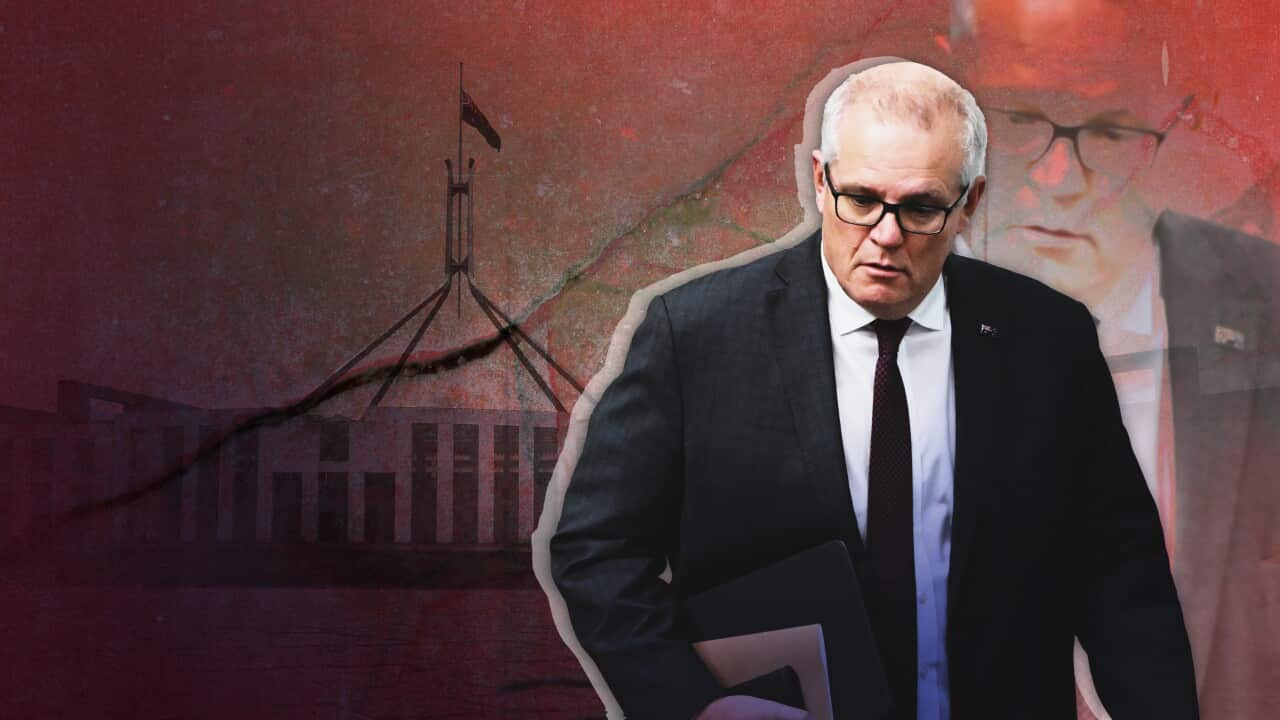Key Points
- Scott Morrison’s secret ministerial appointments were legal, according to the Commonwealth solicitor-general.
- But they were not consistent with the principle of "responsible government" laid out in the Constitution.
Scott Morrison’s secret ministerial appointments were legal, according to the Commonwealth solicitor-general - but they were not consistent with "responsible government."
The following revelations Mr Morrison was secretly sworn into five different portfolios during 2020 and 2021.
Mr Albanese said federal cabinet had agreed to hold an independent inquiry into Mr Morrison's actions.
By the end of his tenure as prime minister, Mr Morrison was appointed minister for the health, finance, industry, energy and resources, treasury and home affairs portfolios.
The advice provided to the government relates to Mr Morrison's control over the Industry, Science, Energy and Resources Portfolio (DISER) - where he used his powers to veto a controversial gas proposal.
Stephen Donaghue, QC, found the appointment of Mr Morrison "valid" but added the the failure to make those appointments secret from cabinet colleagues and the public was not consistent with the principle of "responsible government" as laid out in the second chapter of the Constitution.

Solicitor-General of Australia, Stephen Donaghue QC in 2017. Source: AAP / DARREN ENGLAND
"The undermining of responsible government therefore does not depend on the extent to which Mr Morrison exercised powers under legislation administered by DISER, because from the moment of his appointment he was both legally and politically responsible for the administration of that department, and yet he could not be held accountable for the way that he performed (or did not perform) that role."
Chapter II of the constitution is "deliberately" vague in detail when it comes to the executive powers of the Commonwealth.
But the advice notes the High Court has found the constitution is “permeated through and through with the spirit of … the institution of responsible government”.
Responsible government means the government is responsible to the elected members of parliament, and through them, to the electorate.
In a statement released on Facebook following the release of the Solicitor-General's advice, Mr Morrison again defended his actions as necessary due to the "serious crises" facing Australia at the time.
"I note that the Solicitor General found that the appointments were ‘valid’ and that ‘while there is some historical precedent for the publication in the Gazette of appointments to administer particular departments of State under s 64, there is no consistent practice in that regard," he wrote.
"In hindsight, some of these decisions will be reflected upon now and lessons learned. The Solicitor General has noted a number of these points from his perspective in his advice and I am sure this will help guide any changes in these areas."
The former prime minister said he would be willing to assist "any genuine process" to examine the pandemic response.
"I accept that many Australians will not agree with, accept or understand all the decisions I made during those difficult times. I can only state that I took the decisions I did as Prime Minister with the best of intentions, in good faith and to do all I could to protect Australia in the face of multiple crises," he said.
"I am proud and thankful for what we were able to achieve in such difficult circumstances."
'Shambles and chaos'
Mr Albanese said the advice laid out "a very clear criticism and critique of the implications ... for our democratic system of government".
The nature and scope of the inquiry are yet to be determined by cabinet, but Mr Albanese confirmed it would examine what happened, the legal implications and future reform.
"My consideration has been to get to the bottom of what is happening - the inquiry needs to do that," he told reporters in Canberra.
"I want to run a government that gets proper advice and makes decisions based upon it, in contrast to what we have seen of the shambles and chaos of the government that we have succeeded."
He said there were more questions to be answered with the impact on contracts and other agencies to be considered.
"There are other potentials as well, the former prime minister for example was the health minister and the industry minister at a time when we were considering the mRNA vaccine manufacture in Australia," he said.
From the moment of his appointment he was both legally and politically responsible for the administration of that department, and yet he could not be held accountable for the way that he performed (or did not perform) that role.Solicitor-General Stephen Donaghue QC
Mr Morrison's appointments were signed off by Governor-General David Hurley using administrative instruments and were not publicised by the government at the time.
Most of his cabinet colleagues were also unaware of the secret appointments.
The solicitor-general found Mr Hurley's actions were consistent with convention.
"The Governor-General has no discretion to refuse to accept the Prime Minister’s advice in relation to such an appointment," he wrote.
Mr Albanese reaffirmed his support for the governor-general and said the Department of Prime Minister and Cabinet would work with the office of his Official Secretary to ensure all future ministerial appointments are published in the Parliamentary Gazette.
On Monday, the Office of the Official Secretary to the Governor-General voiced support for reforms to increase transparency around ministerial appointments.
Having assumed the powers of resources minister, Mr Morrison intervened to block the PEP-11 gas exploration license off the coast of NSW, overruling Resources Minister Keith Pitt.
The decision is now subject to a Federal Court Appeal.
Mr Morrison has claimed this was the only use of his powers.
Former home affairs minister Karen Andrews has called on Mr Morrison to resign from his position as member for Cook following the scandal.
SBS News has contacted Mr Morrison for comment.











